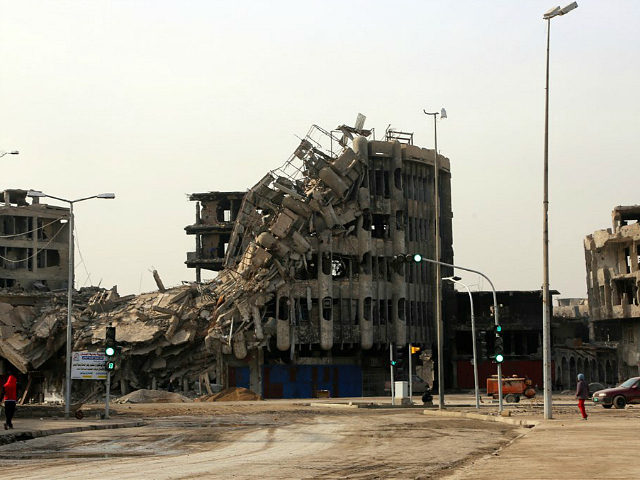The cost of rebuilding Iraq after nearly three years of the U.S.-backed war waged by local troops against Islamic State (ISIS/ISIL) jihadists is expected to exceed $88 billion, Iraqi officials reportedly told international donors.
“When the costs of improving governance, upgrading oil and gas infrastructure and other ‘recovery’ expenses are factored in, the needs of the largely Sunni areas rise to $88.2 billion,” reported the Wall Street Journal (WSJ), citing a new assessment by experts at the World Bank and the Iraqi government.
“Iraqi officials, who note that the years of fighting diverted resources that might have been used to upgrade Shia-dominated areas are hoping to attract even more funds. All told, the Iraq government is seeking about $100 billion in foreign investment for its energy, agricultural and transport sectors,” added WSJ.
The Journal published the article on the cost of rebuilding the war-ravaged country ahead of comments by Iraqi officials to international donors during a conference in Kuwait Monday, noting that the World Bank assessment is expected to frame reconstruction arguments during the three-day event.
Referring to the more than $88 billion in reconstruction expenses, Reuters reported Monday, “About $23 billion will be needed in the short term and more than $65 billion in the medium term, the director-general of Iraq’s planning ministry, Qusay Adulfattah, told the conference.”
The conference, which took place in Kuwait, involved donors and investors discussing efforts to rebuild Iraq’s economy and infrastructure following the defeat of ISIS jihadists who conquered nearly a third of the country.
Prior to the reconstruction debate, WSJ noted Monday:
The U.S.-backed military campaign that defeated Islamic State militants in Iraq has resulted in $45.7 billion in damage to the country’s houses, power plants, schools and other civilian infrastructure, according to a new assessment by experts at the World Bank and the Iraqi government.
…
The damage to the housing sector is $16 billion, while damage to electrical power plants and the power sector is $7 billion, according to the assessment. Damage to the educational sector is assessed at $2.4 billion.
International investors, aid experts, and top diplomats, including U.S. Secretary of State Rex Tillerson, are scheduled to attend the conference.
“Iraq is emerging from a devastating period of conflict and violence,” noted the World Bank study cited by the Journal. “The immediate concern is to restore the productive means of livelihood for millions of people in agriculture, services, and industry.”
“Rebuilding Iraq is restoring hope to Iraq, and restoring the stability of Iraq is stabilizing the states of the region and the world,” Iraq’s Planning Minister Salman al-Jumaili said during the meeting in Kuwait, according to Reuters.
Both the Journal and Reuters acknowledged that most of the fighting during the ISIS war took place in seven Iraqi provinces.
“The U.S., which has already spent billions of dollars on the war against ISIS and in providing aid to displaced Iraqis and Syrians, doesn’t intend to donate funds for Iraq’s reconstruction,” pointed out WSJ. “Rather, the U.S. Export-Import Bank plans to sign a memorandum of understanding to facilitate project financing. U.S. officials haven’t specified the amount, but it is expected to be in the neighborhood of $2 billion to $3 billion.”
In December 2017, Baghdad declared victory over ISIS having taken back practically all the territory seized by the terrorists in 2014 and 2015.
The jihadist group had lost “98 percent of the territory it once held” as of the end of last year, Breitbart News reported.
Nevertheless, U.S. and Iraqi officials have warned that ISIS remains a threat in Iraq, with pockets of fighters still posing a menace.

COMMENTS
Please let us know if you're having issues with commenting.